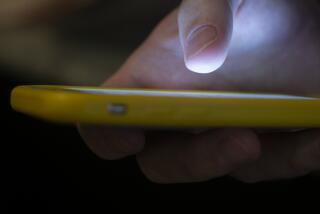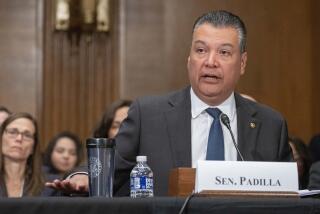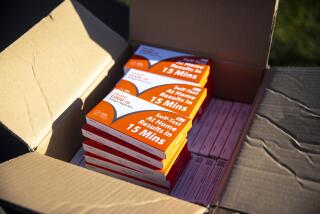Caller Charged Up About 976 Service
- Share via
Question: Something has happened to a young man who works for me that I think is outrageous. He and his wife desperately need an apartment (they’re now living with her parents), and he found a card nailed on a telephone pole advertising an apartment and giving a phone number. When he called the number (several times) all he got was a taped description of about five or six apartments--all of them either out of his price bracket or impossibly far away. When he showed me the number he had called, I recognized the 976 prefix as being that number where it costs you $2, or more, to make the call. It’s obviously a scam, and it seems equally obvious to me that it’s aimed at the naive or the uneducated or those who do not speak English well. Why does the telephone company allow this?--W.P.
Answer: I have the sneaky feeling that whoever conceived the idea of instituting this sort of “information” service within the telephone industry--or let himself be talked into it--has long rued the day. It’s been an almost constant headache.
Even though one can take the charitable view that some of the 976 toll numbers cater to a valid consumer need--your horoscope, gardening tips, inspirational messages and even brief messages from Santa Claus and the Easter Bunny--most of the controversy, so far, has centered around the so-called “adult” services that are offered.
Legitimate Service
Here too however, the point can be made that this is a legitimate service that the telephone company has no business denying anyone.
“We take the position,” Pacific Bell’s media spokesperson Charlene Baldwin says, “that we should be able to choose not to do business with these adult services, and we’ve gone to court to get permission along these lines. But, until we get it, our hands are tied.”
No complaints, Pacific Bell concedes, are received from those who call these numbers voluntarily. (And let’s drop the adult designation here. Most of them are either “sexually explicit,” at the least, or are downright obscene.)
“Most of the complaints,” Baldwin adds, “are from parents.” Parents, generally, of randy teen-agers making call after call after call.
“But we had quite a few problems around Christmastime,” according to Sandy Hale, another Pacific Bell spokesperson in San Francisco, “with children misdialing and, instead of getting Santa, getting a porno call.” Which may account for some of the offbeat Christmas requests that the real Santa got this past year.
“We’ve got a request before the Public Utilities Commission,” Hale said, “to get away from the single 976 prefix and set up separate 900 prefixes for different types of messages to reduce the chance of misdialing.”
And, even now, parents of teen-agers seething under a barrage of monthly $100 phone bills to a variety of 976 numbers can, without charge, have their phone number blocked--no 976 calls can be made from that number. Those who have been charged for one or two 976 calls and didn’t know that a $2 charge was involved can have them removed from their bill. (Not indefinitely, however, Hale adds).
The type of call that has offended you, and many others, is a slightly different breed of cat. There are certainly well-grounded suspicions on everyone’s part, including the phone company’s, that the “information” provided is virtually useless and is offered simply to generate a lot of $2 calls. But denying them the service, under the present law, is almost impossible as long as they comply with the primary Bell requirement: that the caller be notified beforehand that there is a charge.
Technical Compliance
“And the two organizations doing this in both Los Angeles and San Francisco,” Hale adds, “are putting that notation on their signs and are, technically, in compliance.” However, a consumer advocacy group in San Francisco, Consumer Action, is attacking the problem from a different direction; not that the information provided is “virtually useless,” according to executive director Ken McEldowney, but that these companies are engaged in misleading advertising and acting as unlicensed rental-listing services.
“Consumer Action,” Hale says, “has asked the California attorney general to investigate and the PUC to extend its 976 refund program to these rental services.”
But, so far, there’s been no action. About the only thing you can do in the meantime is to educate the young man working for you about the wolves lying in wait for him and his money.
It’s not the whole answer . . . just the only one available at the moment.
Q: When someone writes you regarding dubious billings to Medicare, you should tell them to either call Medicare at (800) 368-5779 or write to the Department of Health and Human Services, office of the Inspector General, in Baltimore. Medicare will then look into the billing and have the doctor return the amount paid to him.
There are too many abuses of this kind, and if people don’t report it, they are, in essence, perpetuating it. Medicare will also examine the doctor’s charges in other cases to see if similar abuses have occurred. You really should tell people how to “right a wrong.”--L.M.
A: Yes, you’re certainly right, and I wish that Medicare Beneficiary Services in San Francisco had informed me of this service when I talked to them about this watchdog procedure earlier. The query had to do about an office visit to a doctor when all the doctor did was sign a Department of Motor Vehicles form in order for his patient to get a license plate for the disabled--and the doctor submitted to Medicare a bill for the office visit.
To report such an abuse, you are quite right about the 800 number to call, but I should warn you that it’s almost impossible to get past the busy signal--I tried countless times over a full day and never made it.
The better bet, according to Ron Reepen, a specialist with Medicare Beneficiary, is to write to: Department of Health and Human Services, Office of the Inspector General, Box 11981, Boston, Mass. 21207.
My heartfelt thanks to you.
More to Read
Inside the business of entertainment
The Wide Shot brings you news, analysis and insights on everything from streaming wars to production — and what it all means for the future.
You may occasionally receive promotional content from the Los Angeles Times.










